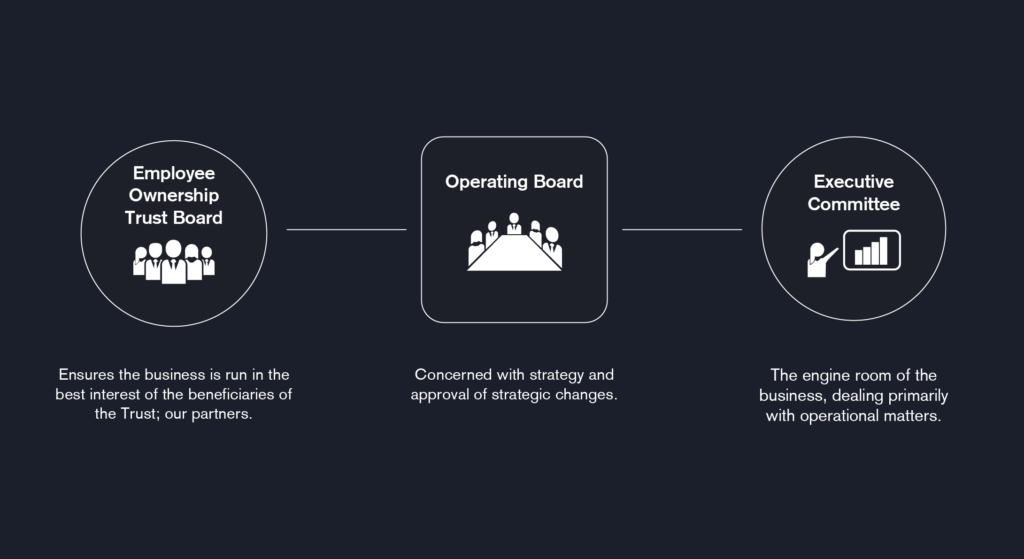
We are a proud employee-owned business; all our employees are partners in the business. This means that every single one of us are committed to making a positive contribution – to both our on-going organisational growth, and to the wider world. Being employee owned means we can transition ownership to the next generation, while maintaining our core values.
As an employee-owned business, we operate with an additional layer of governance in the form of an employee ownership trust board, who act on behalf of our employee partners. This ensures we are managed in a sustainable way that’s in the best interests of our partners. The trust board is one of three strands to our governance, which also includes our executive committee and operating board. Our CEO, Barry, acts as a conduit between the three governance structures:
Employee ownership trust board: ensures the business is run in the best interest of the beneficiaries of the Trust; our partners
Operating board: concerned with strategy and approval of strategic changes
Executive committee: the engine room of the business, dealing primarily with operational matters.
What does having a trust board mean?
As a business that is employee-owned, we have a trust board that’s made up of six employees, two independent trustees, and our CEO. Their key role is to hold the operating board to account and make sure that the business is acting in the best interests of the wider team. We are pleased to report that they carry out this duty extremely well and collaborate brilliantly with our operating board on significant decisions. Their role is also to help communicate changes to the wider team, which they do on a frequent basis. Becoming employee- owned has changed us for the better as a business, making sure that the team have the information, influence and reward that they are entitled to.
“We’ve worked hard to build an understanding of the role of the EOT. Essentially, this comes down to asking if something is really the right decision; and we have the power of veto if we don’t think it is.” Ian Hiscock, Independent Employee Ownership Trustee
The huge value of listening
To augment the powers enshrined in the trust deed, the operating and trust boards have also agreed to a set of rules by which key decisions are made. The operating board now have a duty to inform and consult the trust board, but also in certain circumstances, seek their approval. The trust board, for example, has the power to appoint and remove directors, approve a decision to dispose of a significant part of the business, or approve an acquisition.
“There is a huge value in simply listening to the EOT and understanding the issues that matter to partners at that time. There’s always the potential to hear things that simply wouldn’t come to light in any other forum.” Barry Horner, CEO
This year, our trust board initiated a partner survey, seeking the feedback of the team on several important matters. One part of the survey sought to assess whether partners understood the extent and limitations of the trust, and the second aspect focused on whether the partners’ voices are being heard by the business and appropriately acted on. The survey identified that the team would like to better understand our wider future vison; an issue we addressed during our October team day.
Our next steps
We’ll continue to communicate to our partners about the role of the EOT and how it interacts with other committees at Paradigm Norton. This will help us ensure each team member knows exactly how they can play a key part in delivering our strategy.
Our B Corp score increased by 114.6% in the governance category. To find out more, download our Impact Report 2023 – A big step forward.
